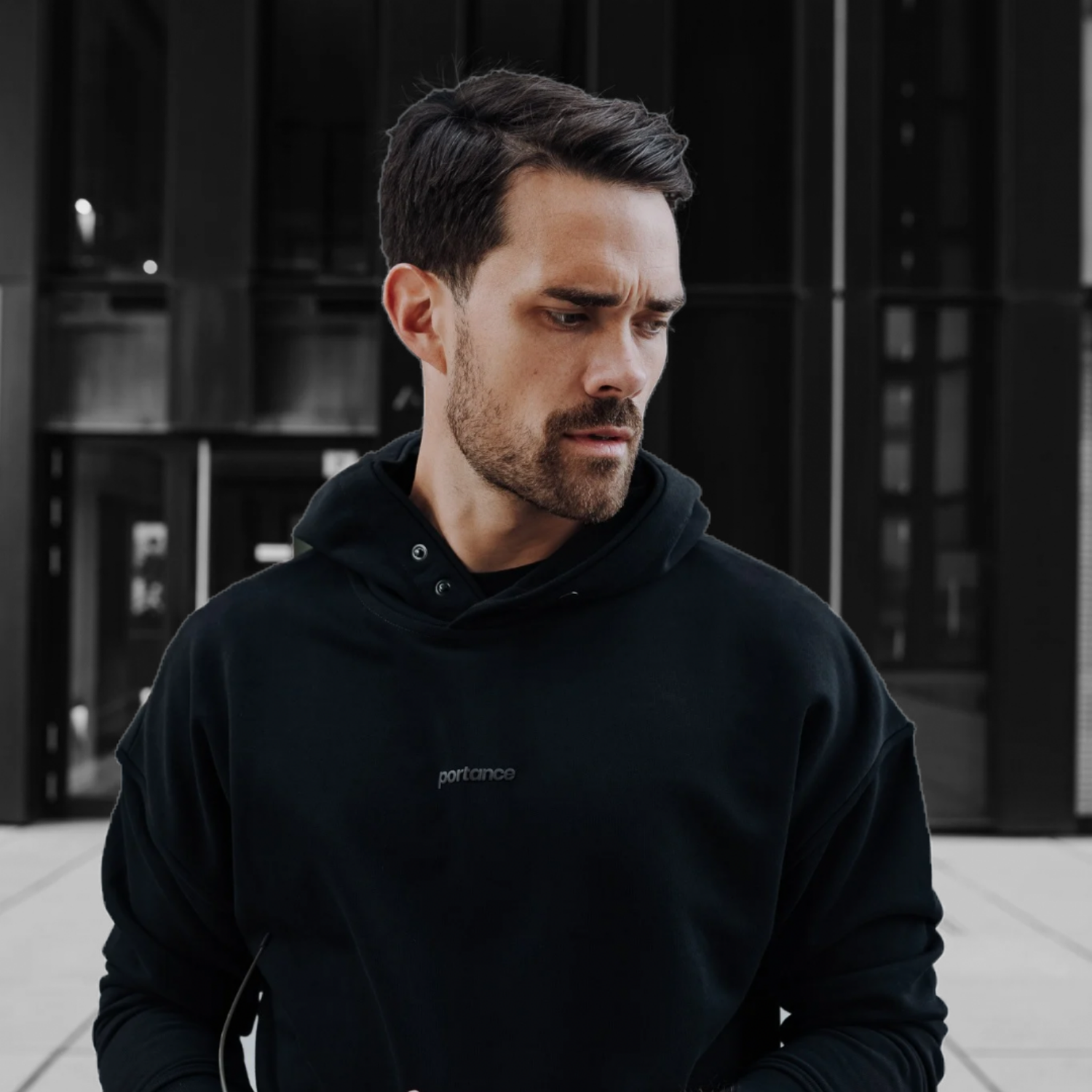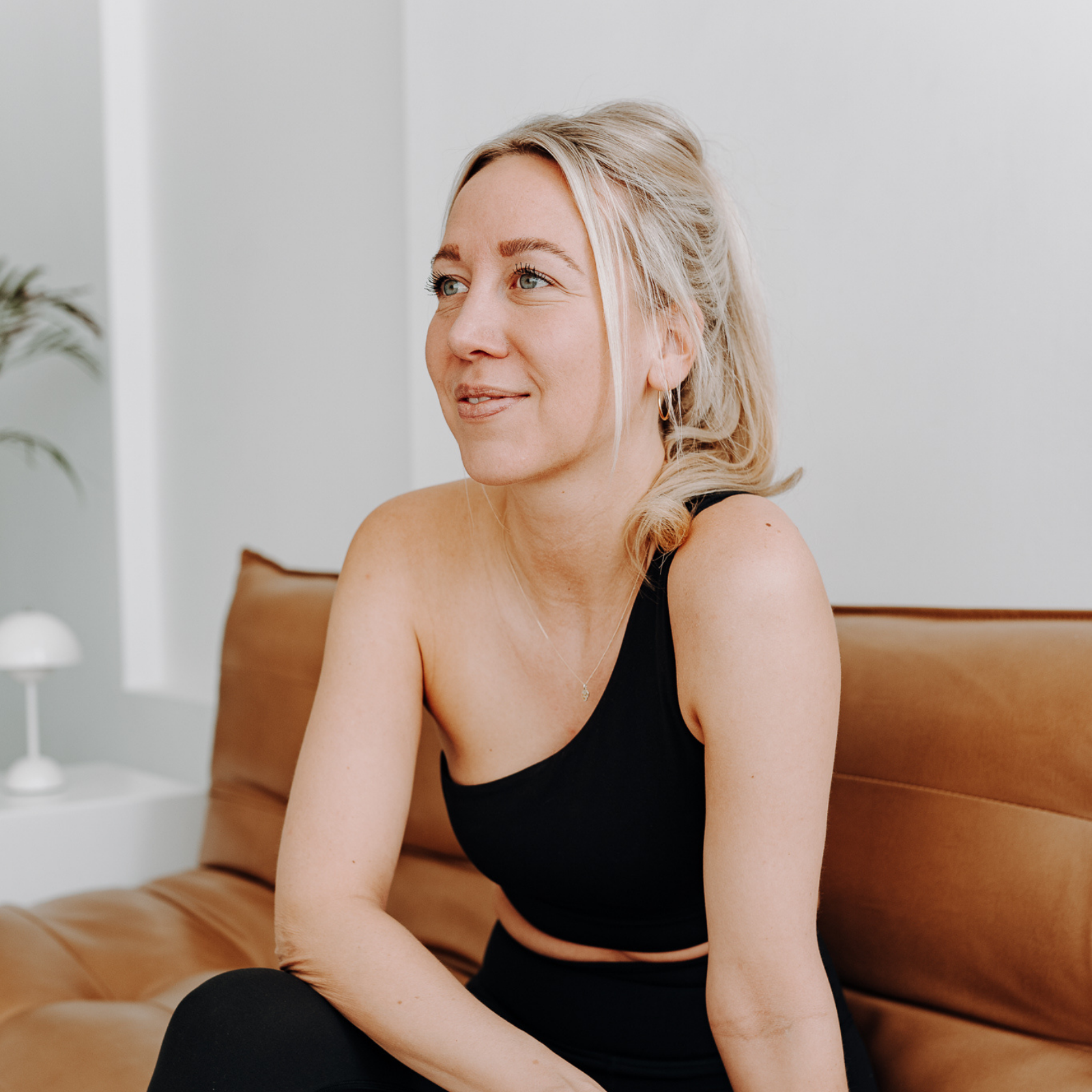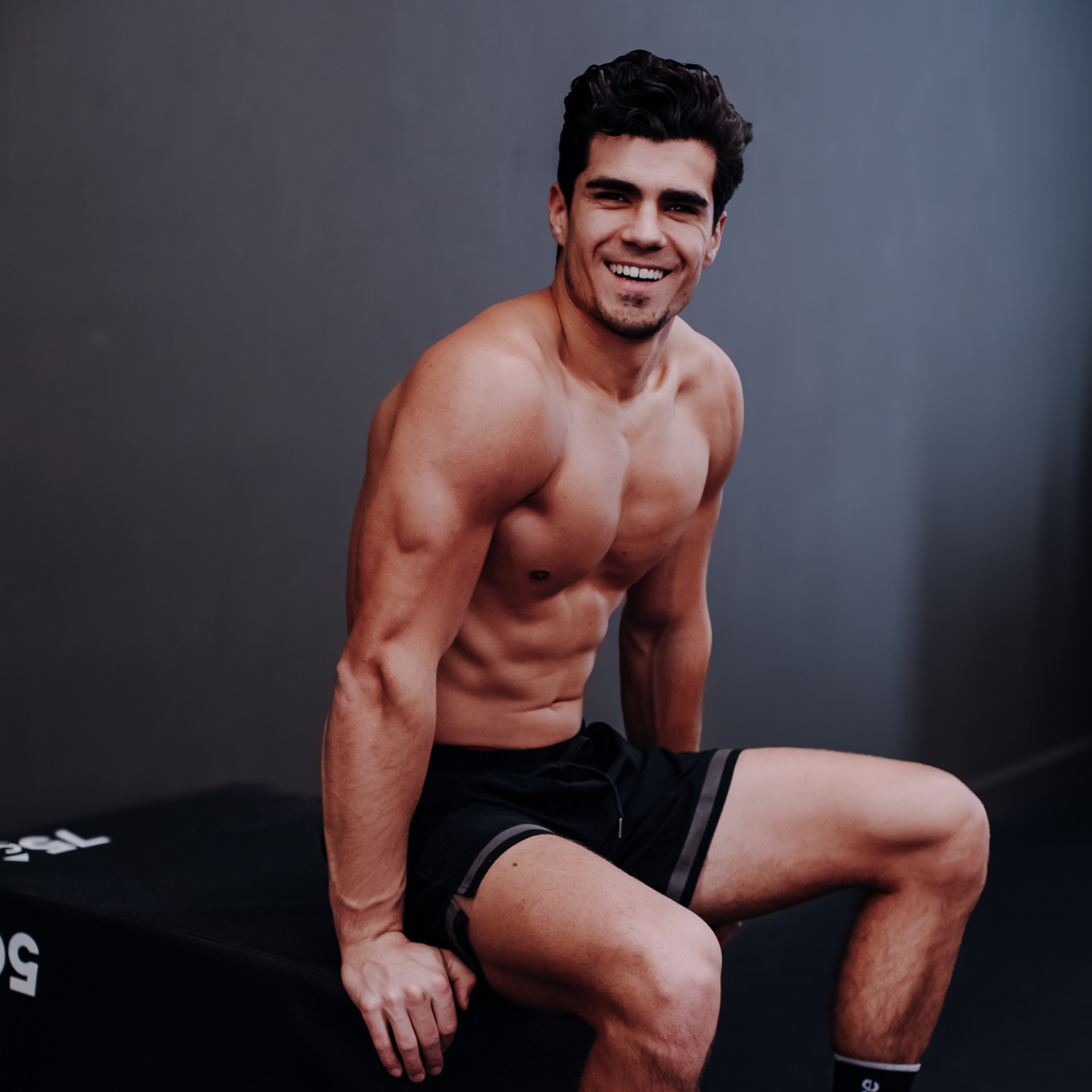Im Gespräch mit Ole Springer, Profi Fussballer bei Rot-Weiss Essen
Ole ist ein smarter, sympathischer Typ, voller Leidenschaft für den Fußball. Er lebt für diesen Sport, der ihm "viel gibt aber auch manchmal einiges abverlangt". Tägliches Training, immer fit sein - und das mental sowie körperlich - und ein Leben bestimmt durch den Spielkalender. All das nimmt der Torwart gerne in Kauf um seinen Traum als Profisportler zu leben. Wir haben ihn getroffen um über seinen Lebensstil, das richtige Mindset und die entscheidenden Momente auf und neben dem Platz zu sprechen.

Ich habe definitiv mein Hobby zum Beruf gemacht und lebe meinen Traum
Dom: Sag uns Doch bitte kurz: Wer bist Du und was machst Du?
Ole: Ich bin Ole, 32 Jahre jung und Profifußballer - genauer gesagt Torwart, aktuell bei Rot-Weiss Essen. Ich habe aber auch einen Masterabschluss in Betriebswirtschaft. Ich freue mich wirklich, jeden Tag raus auf den Fußballplatz gehen zu dürfen und mein Hobby zum Beruf gemacht zu haben.
Dom: Wie bist Du zum (Profi)Fußball gekommen?
Ole: Ja, zum Sport gekommen bin ich wie die meisten Kinder. Mein Vater ist absolut fußballverrückt und hat mich da schon früh geprägt. Auf niedrigem sportlichen Niveau habe ich dann mit Freunden gekickt. Ich hatte einfach Spaß an Bewegung und am Fußball. Später habe ich dann auch tatsächlich nicht im Tor angefangen, sondern in der Abwehr gespielt, bis ich dann irgendwann mal einen Trainer hatte, der meinte, ein gewisses Talent im Tor erkannt zu haben. Ich glaube, so verkehrt lag er damit nicht und dann hat sich eins zum anderen entwickelt und dann ging es halt immer ein paar Sprossen rauf, ehe man dann halt auf einmal Leistungssport gemacht hat
Dom: Jetzt hast du ja auch einen besonderen Werdegang mit deinem BWL Studium. Kannst du dich an diesen Entscheidungsmoment erinnern zwischen "normaler" Karriere oder Profisportler? Gab es den?
Ole: Ich glaube, dass ich da tatsächlich auch viel Glück hatte, dass ich an diesen Entscheidungspunkt nie gekommen bin. Ich weiß nicht, wie ich mich dann entschieden hätte. Studium und Fußball hat sich bei mir nie ausgeschlossen. Das ging gut zusammen. Als ich dann fertig war mit dem Studium, kam ich an den Punkt, an dem dann wahrscheinlich viele diese Entscheidung treffen müssen. Und da hatte ich dann einfach wirklich das Glück, dass Werder Bremen nochmal in die Ecke gekommen ist und gesagt hat: "Hey, wir finden dich als Typ, als Gesamtkonstellation, aber auch als Sportler total spannend." Und so hatte ich dann das Glück sagen zu können: Das ist ein Sechser im Lotto. Ich kann beide Kompetenzen einbringen.
Irgendwann, glaube ich, musst du dann aber sagen: Wenn der Profi-Sport nicht nach ganz oben führt, muss jetzt etwas anderes machen. Aber an dem Punkt war ich bis jetzt nicht und fühle ich mich auch aktuell nicht. Deswegen hoffe ich, dass ich das noch so lange tun kann, wie mein Körper das mitmacht. Und aktuell würde ich sagen, das ist noch ziemlich lange (zwinkert).
Dom: Wie sieht dein Sportler Alltag aus?
Ole: Ich stehe morgens um 8 auf, mache mich fertig, gehe zur Arbeit. Am Stadion angekommen trinke ich meist einen Kaffee und habe dann in der Regel noch ein bis zwei Stunden Zeit bis zum Training. Da mache ich mich warm, gehe in den Kraftraum, mache ein paar Mobilitätsübungen, dass mein Körper auch ein bisschen auf Betriebstemperatur kommt und Verletzungen vorgebeugt werden. Dann geht es raus auf dem Platz. Anderthalb Stunden bin ich dann in der Regel aktiv auf dem Platz, mit dem Torwarttrainer, später dann aber auch mit der Mannschaft. Und dann ist man irgendwann um eins, halb zwei durch mit dem sportlichen Teil. An manchen Tagen hängt man dann noch eine Krafteinheit hinten dran, sodass man üblicherweise um 14, 15 Uhr wieder zu Hause ist.
Dom: Würdest Du sagen, du lebst deinen Traum?
Ole: Ich habe definitiv mein Hobby zum Beruf gemacht und lebe meinen Traum. Also ich glaube, wenn man als Kind im Fernsehen Profifußballer sieht und das auch erleben möchte, dann tut man viel dafür. Dann ist man bereit, viel zu trainieren, hart daran zu arbeiten. Trotzdem gehört auch eine Menge Glück dazu - zur richtigen Zeit am richtigen Ort zu sein. Weitestgehend hatte ich das, jedoch glaube ich nicht immer. Weswegen man dann vielleicht auch, wenn man ehrlich ist, nur in der dritten Liga aktuell ist. Aber der Flaschenhals nach oben ist so eng. Richtiger Ort und richtige Zeit, Glück oder Pech zu haben, all das macht dann oft den Unterschied zwischen ein, zwei Ligen schon aus.
Und ja, im Großen und Ganzen muss ich wirklich sagen, bin ich mit dem auch, was in meiner Hand lag und was ich tun konnte und wie ich an mir arbeiten konnte, sehr zufrieden.

Dom: Wie wichtig ist absoluter Fokus für Dich?
Ole: Ich glaube als Torwart ist man da auch nicht anders als andere Sportler. Man versucht immer, in diesen Flow zu kommen. Man versucht immer, diesen Peak an Leistungsfähigkeit zu erreichen. Das geht nicht auf Knopfdruck. Da muss man insbesondere auch in der Vorbereitung einfach auf dem Punkt sein. Man muss als Fußballer jetzt eine ganze Woche darauf hinarbeiten, sowohl athletisch als auch mental, als auch gesundheitlich. Viel Schlaf, gute Ernährung. Das sind tatsächlich Punkte, die eine Rolle dabei spielen, im entscheidenden Moment da zu sein. Und selbst das gibt einem noch keine Garantie. In der Regel ist es bei mir aber so, dass ich, wenn ich all diese Dinge berücksichtige und mich wirklich professionell auf den Moment vorbereite, ich auch da bin. Ich mich dann auch entsprechend fühle und mir das auch einfach aus tiefstem Inneren das Gefühl gibt, ich bin der Aufgabe, die da vor mir steht, gewachsen.
Dom: Wie kommst Du in diesen Fokus und Flow vor dem Spiel?
Ole: Das geht mit der Vorbereitung erneut einher. Wenn ich wirklich auf den Punkt vorbereitet bin, fühle ich mich gut, fühle ich mich großartig. Dann freue ich mich auf das Spiel. Wenn ich nicht gut vorbereitet bin, was eigentlich ausschließlich vorkommt, wenn mich irgendwelche externen Dinge dazu zwingen, beispielsweise wenn man dann doch mal ein bisschen kürzer treten musste im Training oder vielleicht eine englische Woche hatte, wenig Regenerationszeit, dann ist man mit Sicherheit ein bisschen angespannter. Man merkt, man ist vielleicht nicht bei 100 Prozent. In der Regel macht es mir aber wahnsinnig viel Spaß, Fußball spielen zu dürfen und deswegen kann ich sagen, freue ich mich eigentlich auf die Spiele.
Als Profisportler kennt man natürlich Druck. Leistungsdruck, Erwartungsdruck von außen. Aber ehrlicherweise auch den von innen heraus, von einem selbst.
Dom: Wie gehst du persönlich mit Druck um und wie verspürst du diesen?
Ole: Als Profisportler kennt man natürlich Druck. Leistungsdruck, Erwartungsdruck von außen. Aber ehrlicherweise auch den von innen heraus, von einem selbst. Und der war und ist in meiner Karriere eigentlich immer der größere. Die Erwartungen, die ich an mich selbst habe, sind in der Regel größer und auch belastender, als das, was von außen auf einen einprasselt. Man lernt aber damit umzugehen. Ich glaube, das ist auch ein Erfahrungswert, den man über die Jahre aufbaut. Ich bin ja jetzt insgesamt 22 Jahre im Leistungsfußball und es war immer in irgendeiner Form Druck auf dem Kessel. Mal willst du aufsteigen, mal darfst du nicht absteigen. Und du gewöhnst dich dran, du lernst damit umzugehen. Und ich habe für mich da die Routinen und die Abläufe entwickelt, einfach wirklich mir auch zu sagen, wenn ich maximal vorbereitet bin und dann Dinge schief gehen, dann ist das so.
Dom: Wie wichtig sind Routinen für dich?
Ole: Routinen helfen einem natürlich in den angesprochenen Flow zu kommen. Wenn man feste Abläufe bis zu einem Anpfiff hat, dann merkt auch der Körper irgendwann: Okay, ich kenne diese Situation, ich weiß, was von mir verlangt wird. So habe ich zum Beispiel immer den komplett gleichen Warm-up Ablauf. Vom Moment an, wo ich den Rasen betrete bis ich dann wieder in die Kabine gehe und mein Trikot ausziehe, ist es immer der komplett gleiche Ablauf. Einfach nur, weil ich merke: Mein Körper kommt dann auch in den Wettkampfmodus und auch mein Geist weiß, worauf es jetzt ankommt. Und wenn man dann doch mal ein bisschen nervöser ist oder ein etwas mehr Druck verspürt, dann hilft einem dieser Ablauf sich zu erden und wieder runterzukommen.
Dom: Welche Rolle spielt das richtige Mindset bei all dem?
Ole: Mindset ist aus meiner Sicht im Leistungssport allgemein das A und O. Gerade ab einem gewissen Level. Also wir reden ja jetzt wirklich über den Spitzensport, wo man halt wirklich sagt: Jeder, der da ankommt, kann was. Jeder dort hat ein gewisses Talent, hat die körperlichen Voraussetzungen dafür und da sind es dann genau die Kleinigkeiten, die den Unterschied ausmachen. Und die definieren sich meiner Meinung nach sehr stark über das Mindset. Wie sehr will ich das und was bin ich bereit an Opfern dafür zu bringen? Ich habe in meiner Karriere sehr, sehr viele unglaublich talentierte Fußballer kennenlernen dürfen, die dieses Mindset nicht mitgebracht haben und die es dann in der Regel auch nicht geschafft haben. Also mir fallen auf den Schlag nur ein, zwei Ausnahmen ein, wo ich sage, die waren einfach so unfassbar gut, die haben dann trotzdem ihren Weg gemacht. Und andersrum gibt es halt auch die Sportler, wo du sagst, die sind nicht außergewöhnlich talentiert, die wissen aber, worauf es ankommt. Die sind auf den Punkt da, leben wie Vollprofis und die machen dann deshalb ihren Weg.
Dom: Und wo siehst Du dich da eher?
Ole: Ich persönlich würde mich auch eher bei der zweiten Kategorie einordnen. Ich glaube nicht, dass ich mit übermäßig viel Talent gesegnet wurde. Aber es war mit zehn Jahren für mich bereits klar, ich möchte in das Leistungszentrum von St. Pauli, ich möchte mir jeden Tag 100 Kilometer um die Ohren hauen und ich möchte da auf ein Ziel hinarbeiten. Und deswegen habe ich mich auch über die Jahre konstant dahin entwickelt, wo ich heute angekommen bin, auch leistungstechnisch. Wie gesagt, übermäßiges Talent würde ich mir an der Stelle tatsächlich gar nicht bescheinigen.

Ich glaube, Resilienz ist die Grundvoraussetzung dafür, um erfolgreich im Leben zu sein.
Dom: Lass uns über Resilienz sprechen. Auch beim Sport sehr wichtig, oder?
Ole: Ich glaube, Resilienz ist die Grundvoraussetzung dafür, um erfolgreich im Leben zu sein. Ich würde das gar nicht auf den Sport beschränken. Dass es im Leben immer bergauf geht und immer alles nach Plan läuft, ist utopisch.Genauso im Sport. Man verliert wichtige Spiele, man hat mal eine schlechte Phase, man spielt mal nicht. Wenn man dann sofort hinwirft, sagt es ja schon die Logik, dann kann man nicht mehr erfolgreich werden, dann hat man nämlich aufgehört. Und da dann gegen Widerstände anzugehen, resilient zu sein, sich auch beim Thema Mindset selber immer wieder an den Punkt zu bringen und zu sagen, ich will mich trotzdem entwickeln, ich will trotzdem vorankommen, das ist das A und O, um im Leistungssport, aber auch im Leben erfolgreich zu sein. Davon bin ich überzeugt. Und das lebe ich, glaube ich, auch seit 22 Jahren vor.
Dom: Wie stehst du zu Niederlagen? Für dich ein Prozess des Lernens?
Ole: Ich bin ein wahnsinnig schlechter Verlierer. Das kann auch jeder bestätigen, der schon mal mit mir "Mensch ärgere dich nicht" oder irgendwas gespielt hat. Ich hasse es zu verlieren, aber habe für mich auch wahnsinnig viel Kraft schon aus Niederlagen ziehen können, weil ich halt fast jede Niederlage oder eigentlich immer, wenn irgendwas schief geht, das hinterfrage. Es führt manchmal auch tatsächlich einfach dazu, dass man sagt, es war Pech. Aber oft führt es eben auch zu Entwicklungs- und Lernprozessen, die man dann selber vorantreiben kann. Und dann aus Niederlagen Kraft für die Zukunft zu ziehen ist so ein bisschen auch zu meinem Lebensmotto geworden.
Dom: In einem unsere früheren Gespräche hast du auch mal gesagt, dass gerade die Torwartposition etwas Besonderes im Fussballsport ist. Kannst Du das erläutern?
Ole: Als Torwart bist du in der Regel nicht körperlich gefordert über 90 Minuten, sondern mental. Also dass du wirklich Aktionen im Spiel hast, das ist ja abhängig vom Gegner, aber vielleicht summiert sich das auf ein bis zwei Minuten im Spiel, in denen du wirklich aktiv körperlich eingreifen musst. Die anderen 88 Minuten bist du erstmal auf den ersten Blick unbeteiligt. Und umso mehr gilt es, in dieser Zeit fokussiert zu sein, im Spiel zu bleiben. Weil du kannst nicht einfach sagen: Jetzt ist der Ball vorne, jetzt bin ich mal gedanklich schon beim Abendessen. Sondern du musst wirklich deinen Geist fast die gesamte Zeit an die Grenze bringen. Und deswegen bin ich zum Beispiel auch jemand der nach 90 Minuten mehr als am Ende ist. Das mag jetzt erstmal witzig klingen, aber ich sitze manchmal im Mannschaftsbus und werde von Krämpfen geplagt, weil einfach der Geist viel Energie verbraucht hat. Das Gehirn ist ja der größte Energieverbraucher des Körpers. Und diese Anspannung das ganze Spiel aufrecht zu halten, ist ehrlicherweise für mich anstrengender als jeder 10, 15 Kilometer Lauf, den ich mal hobbymäßig mache.
Dom: Für Rot-Weiss Essen bist du momentan der 2. Torwart. Macht das einen Unterschied für Dich und wie gehst du damit um?
Ole: Also wenn man sich das vielleicht mal vorstellt: Als Sportler will man ja raus am Wochenende, man will sich beweisen, man will sich zeigen und darf es dann aber nicht, hat ehrlicherweise auch keine Chance, das von sich heraus zu ändern. Es gibt erstmal eine Nummer eins und die spielt auch. Außer sie hat vielleicht mal einen Leistungseinbruch, eine Verletzung oder eine Sperrung. Und deswegen gilt es, diese Position und diese Situation anzunehmen, mit sich im Reinen zu sein und wirklich trotz allem elf Monate im Jahr bei 100 Prozent zu sein.Denn wenn dieser eine Moment kommt, dann muss man da sein. Und man kann nicht einfach sagen, ich mache jetzt mal nur 70 Prozent und wenn ich dann gebraucht werde, bin ich schon da. Nein, man muss wirklich immer leistungsbereit sein, man muss immer bei 100 Prozent stehen, denn man weiß nie, wann der Tag kommt, an dem man gebraucht wird.
Dom: Okay Ole, letzte Frage und die ist ganz eigennützig. Du kennst ja portance und weisst was mir machen. Hand aufs Herz: Was denkst Du als Profisportler über Sportkleidung, die Schweißgerüche eliminiert?
Ole: (Lacht). Ich glaube, Schweißgeruch und gerade alten Schweißgeruch mag keiner. Deswegen ist es natürlich cool, wenn man Kleidung hat, die auch trotz Anstrengung und Schweiß, trotz heißer Temperaturen nicht anfängt zu riechen. Deswegen ist es mit Sicherheit gerade auch privat, würde ich sagen, wichtig. Auf dem Sportplatz, bin ich ehrlich, ist es mir nicht so wichtig, ob mein Gegenspieler vielleicht einmal kurz denkt: "Die Klamotten von ihm sind aber ganz schön durchgeschwitzt". Aber wenn man privat Sport treibt, zum Beispiel auch mal einen längeren Lauf macht, sind wir ehrlich, wäscht man seine Sportsachen ja manchmal auch nicht direkt, sondern lüftet sie nur. Und wenn man dann am nächsten Tag wieder unterwegs ist und dann ist es natürlich toll, wenn man Produkte hat, die nicht nach Schweiß riechen. Ich glaube auch, dass es da einfach einen riesen Unterschied macht, ob man billige Produkte hat, die den Schweiß aufsaugen und dann noch haften bleiben oder ob man qualitativ hochwertige Produkte hat, die den Schweiß abweisen oder eliminieren, sodass man sich eigentlich jeden Tag aufs Neue frisch fühlen kann.
Dom: Super, danke Dir für das offene Gespräch Ole.
Ole: Dank Euch und dir, Dome!

Campaign Video by @freiluftfilm
Follow Ole on Social Media: @ole_springer31




Hinterlasse einen Kommentar
Alle Kommentare werden vor der Veröffentlichung geprüft.
Diese Website ist durch hCaptcha geschützt und es gelten die allgemeinen Geschäftsbedingungen und Datenschutzbestimmungen von hCaptcha.